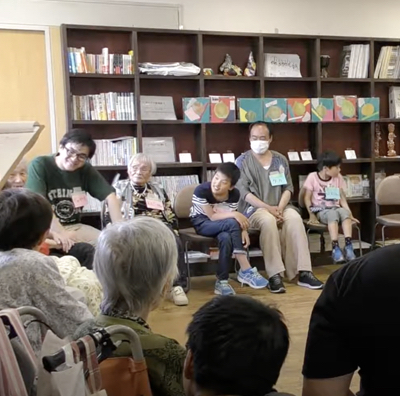
Abstract:
Intergenerational theater activities have been recently employed in recreation for older adults.We held a series of four intergenerational theater workshops in two older adults’ care facilities in Japan and sought the experiences of older participants, younger participants, and the facility managers.
With a qualitatively driven mixed-methods multiple-case study design, we obtained data from field observation, interviews with participants, and preworkshop and postworkshop changes on a well-being scale (Ikigai-9) among older participants, and the results of the two sites were compared. “Immediate effects” were seen in older adults because they responded actively and demonstrated surprising faculties during the workshop.
Facility staff members and younger participants received “extended effects” because they gained new ideas regarding the remaining skills of older participants and a sense of reuniting with old neighbors through the exercise.
In the Ikigai-9 scale, the items measuring “present happiness” significantly improved at Site 1 but not at Site 2. Better results at Site 1 might have been caused by the lower care needs of participants and the inclusion of children.
Less support from facility staff members during the activities also might have promoted the voluntary participation of older adults. Involving children and engaging the facility staff in preparation could enhance the quality of activities.
アブストラクト:
近年、高齢者向けレクリエーションにおいて、世代を超えた演劇活動が採用され始めている。本研究では日本の2つの高齢者介護施設において4回の多世代演劇ワークショップを開催し、高齢の参加者、多世代参加者、施設職員の経験を探った。
質的主導の混合法研究デザインにより、フィールド観察、参加者へのインタビュー、高齢参加者のワークショップ前とワークショップ後の幸福度尺度(Ikigai-9)の変化からデータを得て、2つの施設の結果を比較した。高齢参加者にはワークショップ中に積極的に反応し、意外な能力を発揮するなどの「即時的効果」が見られた。
施設職員や若い参加者には、高齢者の残存能力に関する新たなアイデアや、ワークを通じて昔の隣人との再会を実感するなどの「波及効果」が見られた。幸福度においては、「現在の幸せ」を表す項目が、会場1では有意に改善されたが、会場2では改善されなかった。会場1では、参加者の介護度が低いこと、子どもがいることなどが影響していると思われる。また、施設職員のサポートが少なかったことも、高齢者の自発的な参加を促した可能性がある。加えて、子どもの参加や施設職員の準備への関与は、活動の質を高める可能性がある。